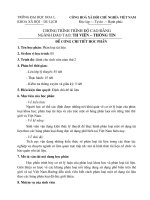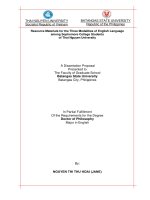Tài liệu: Have and have got
Bạn đang xem bản rút gọn của tài liệu. Xem và tải ngay bản đầy đủ của tài liệu tại đây (12.4 KB, 1 trang )
Have and have got
Have got
means exactly the same as
have
in most cases. Note that
got-forms
of
have
are informal. They are
mostly used to talk about the present time.
Do
is not used in questions and negatives with
got
.
She
has got
a new boyfriend.
Has
she
got
a new boyfriend? (NOT Does she have got a new boyfriend?)
No, she
hasn’t got
a new boyfriend. (NOT No, she doesn’t have got a new boyfriend.)
I
have got
toothache.
Have
you
got
toothache?
No, I
don’t have
toothache.
Got-forms
of
have
are not used in short answers or tags.
‘Have you got a torch?’ ‘No, I
haven’t.
’ (NOT No, I haven’t got.)
Got-forms of have
are not normally used to talk about past events.
I
had
a strange experience yesterday. (NOT I had got a strange experience yesterday.)
Got-forms of have
are not normally used to talk about repeated states.
Compare:
I
have got
a meeting today. (More natural than ‘I have a meeting today.’)
I often
have
meetings. (NOT I often have got meetings.) We do not normally use
have got
to talk about
repeated states.
When
have
is not used with
got,
do
is usually used in questions and negatives.
Do
you often
have
meetings? (NOT Have you often meetings?)
No, I
don’t have
meetings very often.
Be first to know when grammar rules change! Sign up to our newsletter here: englishgrammar.org (It's free)
Powered by TCPDF (www.tcpdf.org)









